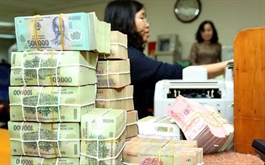Direction clearer in weak bank overhaul
Direction clearer in weak bank overhaul
Decisive action taken by Vietnam’s central bank on restructuring failing banks signifies a considerable stride towards revamping and fostering a sound financial landscape.

According to a report sent to the National Assembly Economic Committee in late April, the State Bank of Vietnam (SBV) has approved the mandatory transfer of four struggling credit institutions (CI) that fall under the special supervision category.
The move includes three CIs that were acquired for the rock-bottom price of zero VND – CBBank, OceanBank, GP Bank – along with DongA Bank.
Previously, four banks had already announced their plans to receive mandatory transfers from weak banks, namely MB, Vietcombank, HDBank, and VPBank.
MB was the first to gather feedback from shareholders regarding the plan to receive mandatory transfers from one weak bank starting in 2022. The compulsory transfer was approved at last year’s AGM and, as per the implementation schedule, the SBV is currently conducting the valuation process, which will be submitted to the government for approval before the transfer takes place.
Vietcombank’s chairman Pham Quang Dung, meanwhile, noted in late April that this lender has completed the mandatory transfer plan with a CI, and is now waiting for the SBV’s approval. He further said that Vietcombank expects to transform this bank into a healthy organisation within 8-10 years.
For some time, there have been rumours in the market about Vietcombank’s possible acquisition of CBBank. In 2015, when CBBank was acquired for nothing due to losses and negative equity, Vietcombank was appointed to participate in supporting the restructuring of the bank.
At its 2023 AGM, HDBank shareholders also approved the bank’s continued participation to restructure CIs according to the direction of the SBV.
Several years ago, news emerged of HDBank’s involvement in supporting the restructuring of DongA Bank. Thus, it is highly likely that both DongA Bank and HDBank will persist on the path of restructuring previously undertaken.
On the same note, chairman of VPBank, Ngo Chi Dung, reaffirmed the bank’s involvement as one of the four banks participating in the restructuring of weak CIs, with proposals currently under review.
Although VPBank has not yet disclosed the target institution, market speculations suggest that it could be the destination for GP Bank. Previously, at the appointment ceremony of GP Bank’s new chairman and CEO in September 2022, a representative of VPBank’s leadership was in attendance.
Furthermore, these supporting banks will receive certain benefits, including exemption from merging distressed banks’ financial statements, allowance for separate consolidated capital adequacy ratios, and greater credit ceilings from the SBV.
Specifically, as per the plan formulated by the SBV, four banks will be mandatorily subject to acquisition, including two banks that have proposed to raise the foreign investor ownership ratio to 49 per cent, in response to the takeover of four underperforming banks.
For Saigon Commercial Bank (SCB), the SBV is carrying out procedures and regulations according to the law to evaluate the overall situation and restructuring plan. This will create a basis for the restructuring of this bank, which will then be presented for official approval.
SCB has been under special supervision since October 2022. The central bank has been working closely with relevant ministries and agencies to implement solutions according to the law to ensure the safety of the banking system and protect the rights and interests of depositors.
Economic expert Can Van Luc said that bank mergers are part of the government’s general policy on restructuring the economy, including credit institutions and enterprises. This policy has been established for a few years, and the government has now set a goal to finalise the process. However, the merger of CIs has been slow due to many reasons.
“Merging them contributes to making the banking market healthier, increasing financial stability and macroeconomic growth,” said Luc.
“If weak banks were allowed to go bankrupt, it would cause a lot of turmoil for depositors. Therefore, mergers are a better option than bankruptcy.”


























